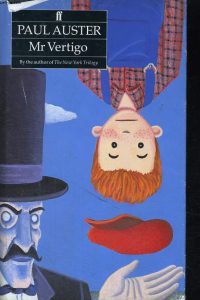 Paul Auster’s Mr. Vertigo begins audaciously, testing our credulity: “I was twelve years old the first time I walked on water.” Are we to take this as a metaphor, a reference to Christ, or a simple declaration of fact? Auster, it turns out, wants it all, the metaphorical, the allegorical and the literal: his narrator and protagonist, Walter Rawley, is living as a street urchin and orphan in St. Louis in the early 1920s when he is approached by Master Yehudi, a total stranger who offers him an intriguing proposition: “If you stay where you are, you’ll be dead before winter is out. If you come with me, I’ll teach you how to fly.” To allay Walt’s doubts, and perhaps demonstrate the extent of his own investment in the cause, Master Yehudi adds a guarantee to the bargain: if he fails to teach Walt how to fly after three years, Walt can cut his head off. What young boy could resist?
Paul Auster’s Mr. Vertigo begins audaciously, testing our credulity: “I was twelve years old the first time I walked on water.” Are we to take this as a metaphor, a reference to Christ, or a simple declaration of fact? Auster, it turns out, wants it all, the metaphorical, the allegorical and the literal: his narrator and protagonist, Walter Rawley, is living as a street urchin and orphan in St. Louis in the early 1920s when he is approached by Master Yehudi, a total stranger who offers him an intriguing proposition: “If you stay where you are, you’ll be dead before winter is out. If you come with me, I’ll teach you how to fly.” To allay Walt’s doubts, and perhaps demonstrate the extent of his own investment in the cause, Master Yehudi adds a guarantee to the bargain: if he fails to teach Walt how to fly after three years, Walt can cut his head off. What young boy could resist?
From here, the narrative sweeps us away to a farm in Kansas, where a young black boy, Aesop, and a native woman, Mother Sioux, round out the cast of characters. Aesop is preternaturally brilliant, an early student of the Master’s, who has educated him that he might become “a shining example to all the downtrodden black folks of this violent, hypocritical country.” Mother Sioux, we later learn, is a descendant of Sitting Bull, and so, like Aesop, connected to that aforementioned violence and hypocrisy by her very being. Walt does not at first take to this arrangement, exhibiting the kind of prejudice and ignorance Yehudi ascribes to the country when he refuses to shake Aesop’s hand upon first encountering him: “I ain’t shaking hands with no nigger. You’ve got to be crazy if you think I’d do a thing like that.” But left alone with these people, and forced to toil on the farm for sixteen hours a day, he can ill afford his prejudices, and it is not long before he looks upon Aesop as a friend and Mother Sioux as, well, a kind of mother. And it’s a good thing he does, for the Master’s plan for him, his “training,” begins with backbreaking farm labour and then gradually escalates into a series of humiliations and sufferings, including being buried alive and having a piece of his finger chopped off. “You have to leave part of yourself behind,” the Master assures him, “before you can attain the full magnitude of your gift.”
After completing the trials, and rising from his own grave, Walt takes flight for the first time:
Presently I grew still, almost tranquil, and bit by bit a sense of calm spread through me, radiating out among my muscles and oozing toward the tips of my fingers and toes. There were no more thoughts in my head, no more feelings in my heart. I was weightless inside my own body, floating on a placid wave of nothingness, utterly detached and indifferent to the world around me. And that’s when I did it for the first time – without warning, without the least notion that it was about to happen. Very slowly, I felt my body rise off the floor.
But shortly after Walt’s triumph, the Ku Klux Klan make an appearance, those most obvious manifestations of hatred and hypocrisy. They arrive on the farm while Walt and the Master are off training, and lynch both Mother Sioux and Aesop, months before he is to matriculate at Yale. Despondent, and sickened with Kansas, Walt and the Master take to the road, touring the country, visiting small towns and large cities, to perform for the masses. In short time, Walt becomes the nation’s most sensational vaudeville act, “Walt the Wonder Boy,” defying physics and inspiring the masses.
And as abruptly as it begins, it comes to a crashing end; our Icarus falls. With the onset of puberty, Walt develops terrible migraines every time he attempts to fly, with the result that he is permanently grounded by his condition, and the fame and success he tasted so briefly disappear. At every turn, Auster is locating his narrative – his highly improbable, fairy-tale of a story – in very real American history, from the lynchings of the Klan to the fates of the St. Louis Cardinals. Walt first defies gravity in August of 1927, the very same year Charles Lindbergh completed the first solo transatlantic flight (in a plane named The Spirit of St. Louis, no less), and he is grounded by migraines in October of 1929, on the day the New York Stock Exchange crashed, setting off the Great Depression. So Walt is something of an allegorical figure, America incarnate, rather than a fully fleshed out human being, but this is in keeping with the fable Auster is telling us with such obvious enjoyment – his and ours.